There will probably be better films this year (I tend to think Clouds of Sils Maria already is), but the chances of there being a more visually sumptuous or more romantic one than Thomas Vinterberg’s Far from the Madding Crowd are slim indeed. This is the kind of film where each new image seems more impossibly beautiful than the last. In fact, the last film I can think of that was this immersively gorgeous was Roman Polanski’s Tess (1979) — another film adaptation of a Thomas Hardy novel, and a film that I’d be hard-pressed to believe didn’t inform the look of Far from the Madding Crowd. (Certainly, this looks more like Tess than it looks like John Schlesinger’s 1967 attempt at Madding Crowd.) There were, in fact, times in the early portions of the film where I suspected that Vinterberg had told his cinematographer, Charlotte Bruus Christensen, “I want this lit to resemble Tess — only with more lens flare.” But as Madding Crowd went along, the more it took on a look of its own. Whatever the case, this is one sublime visual experience. But the film is more than that.
Now, I’ve never read the Hardy novel, and I’ve never made it through the Schlesinger version in one sitting, so I can make little in the way of comparisons to either where the content is concerned. I can, however, say Vinterberg does the one thing Schlesinger couldn’t — he makes the story vital and earthy. Its undeniable romanticism is balanced by underlying themes and a sense of urgency. Oh, it doesn’t take long before you get a pretty good sense of where the film is going to end up, but it constantly pulls you into the journey. This, of course, has a lot to do with Hardy’s basic narrative, which is ripe with incident, constantly changing fortunes and sudden — often implausible — shifts in trajectory. But that doesn’t in itself guarantee a compelling film. (If it did, I’d have made it through the older version in one sitting.) This Madding Crowd feels truly alive with the passions of its principal characters and their shifting situations.
Stripped to its basics, Far from the Madding Crowd is the story of the improbably named Bathsheba Everdene (Carey Mulligan), a woman of no means whatsoever but with a fiercely independent nature in a society — Victorian England — that frowns on such things. At the beginning of the film, a comparatively prosperous sheep farmer, Gabriel Oak (Matthias Schoenaerts, Bullhead and The Drop), wants to marry her — trying to persuade her with the fact that he has 100 sheep. She’s tempted — though not by the sheep. However, he soon suffers the film’s first reversal of fortune and no longer feels worthy of her — especially when she becomes a woman of property via an inheritance. He does, however, end up working for her — a situation that becomes trying when she attracts the attention of flashy soldier Francis Troy (Tom Sturridge, Pirate Radio) and wealthy landowner William Boldwood (Michael Sheen). Gabriel (rightly) considers Troy not good enough for her and suspects her motives where Boldwood is concerned.
What happens is certainly compelling, but what makes all this work lies in the depth with which these characters — even the generally unlikable Troy — are presented and the way in which they truly inhabit the world of the film. Despite the improbable nature of the plot, the characters — and the performers — keep things anchored in a reality that easily trumps the mechanics of the story. The characters live and breathe and, while not always making good choices, engage us from start to finish in a way that few characters do. See this film — it’s wonderful on so many levels. Rated PG-13 for some sexuality and violence.



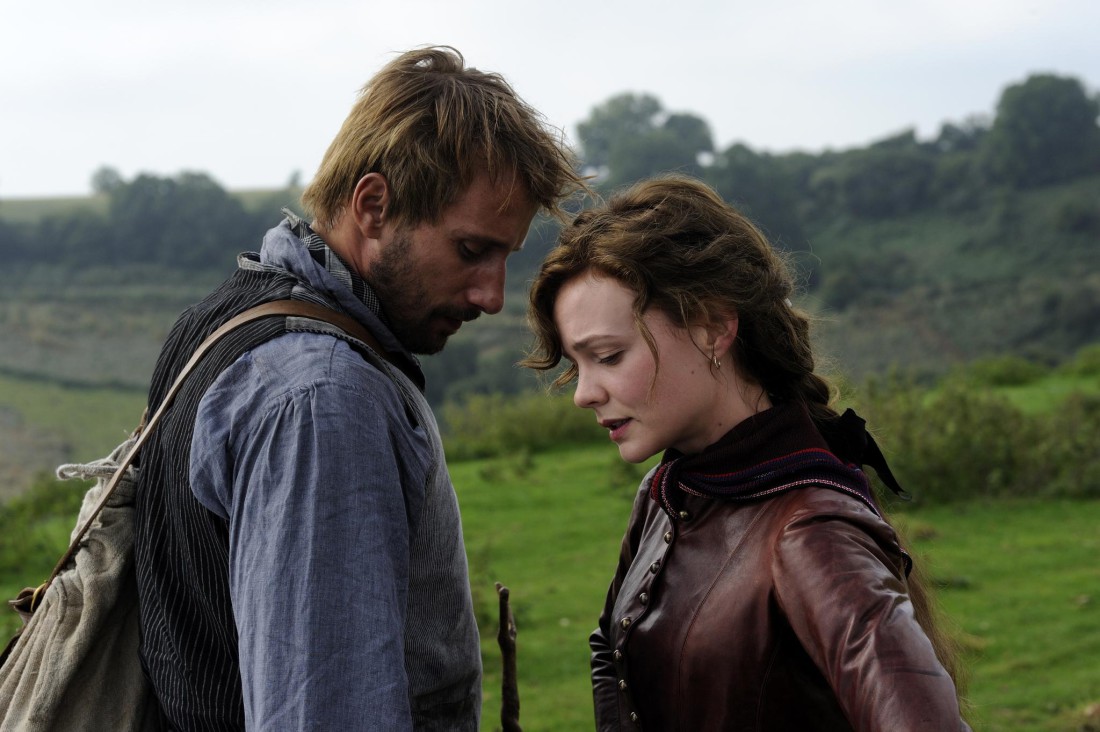
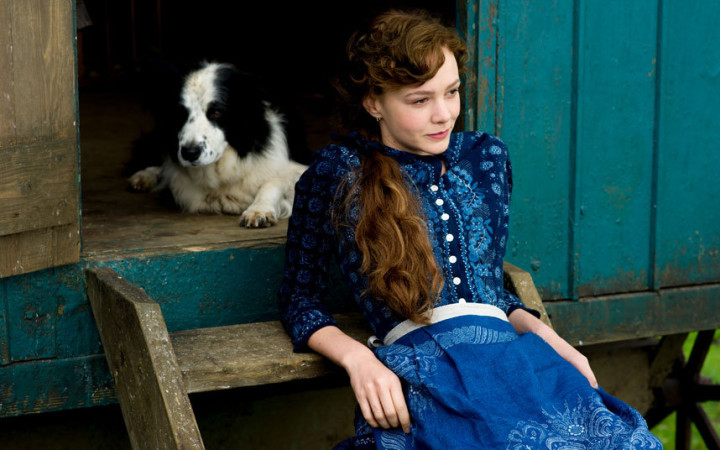
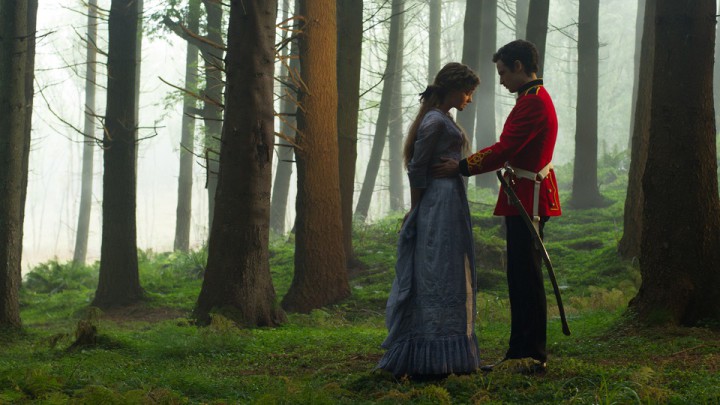
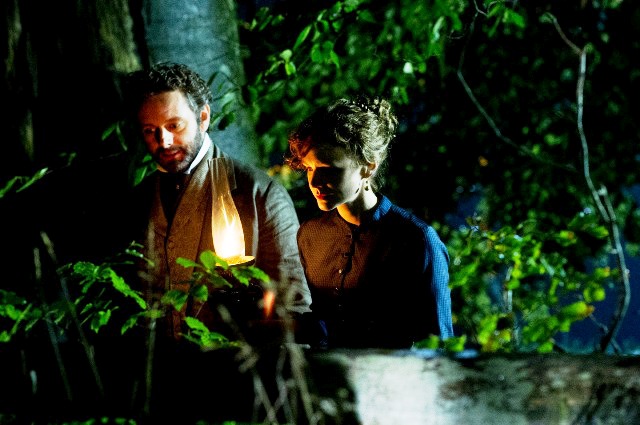
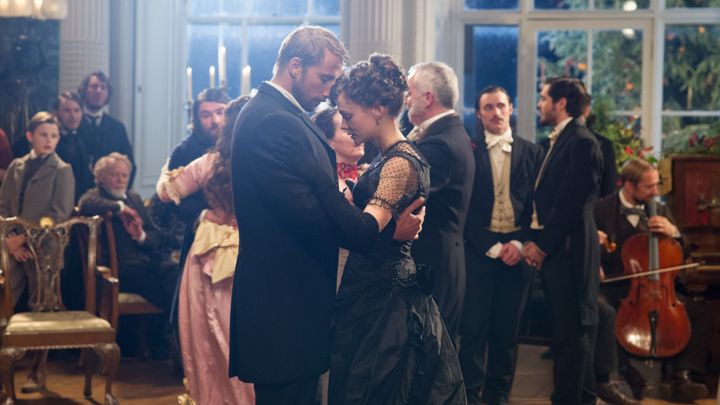
I am a friend of Becky Everhart and she sent me your review. I had to travel an hour to go see Far From the Madding Crowd and I must say it was worth the trip. I absolutely loved this film. The scenery was beautiful. The story was well told. The ending was delightful.
Well, I’m certainly glad it was worth the trip!
More on the characters: Bathsheba is a tease, a Siren. She twists Boldwood (whose name should be Craventwig) into knots. She toys with Gabriel, whose names are both thematically relevant. He is not only a godsend for Bathsheba but as strong in several ways, as his last name implies. Boldwood is a wonderful example of what the literary folks call an “objective correlative”. His head and suit are as empty as the sad mansion he shows Bathsheba in an attempt to win her. Of course, Hardy disdained the class of people that Boldwood represents and often had fun at their expense in his novels. Troy is an impressive swordsman, in both senses of the word, giving one woman a charming haircut with his sabre and another a little Troy with his smaller version of this. In the end Bathsheba chooses Oak, not only because he’s still the most admirable man available, but also because he’s helped her a lot. Thus we have a comedic/happy ending but not a romantic one . The two “lovers”wander off towards Bathsheba’s farm, and Gabriel will presumably provide some little acorns, and these two typically dreary Hardy characters will get a smarter dog and enjoy the little Oakies and the sheep-washing. Kudos to Winterberg et al for turning a 450 page book into an hour and a half of nice Victorian scenery and a bit of foo-foo.
Beautiful looking film is missing the lyricism of the ’67 version. The loss of almost an hour’s running time hurts the story. As for the performances Carey Mulligan (http://careymulligan.org/) is a more somber Bathsheba than Julie Christie was, that’s not bad just different and Matthias Schoenaerts is very good as Gabriel Oak. Michael Sheen is the main sufferer, along with Juno Temple as Fanny Robin, from the editing of the story losing a great deal of character depth in Boldwood but he does what he can. Sturridge however is a disaster as Sgt. Troy, a blank slate who does things with no real rhyme nor reason. It’s the actor not the role because Terence Stamp made him electric in the earlier version.